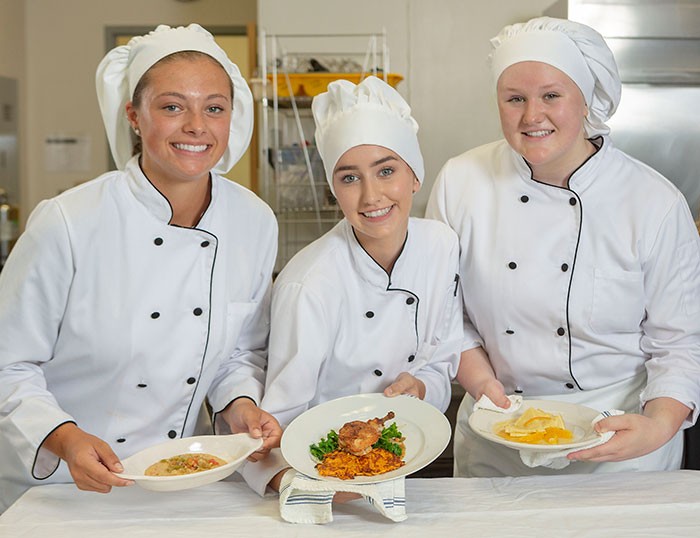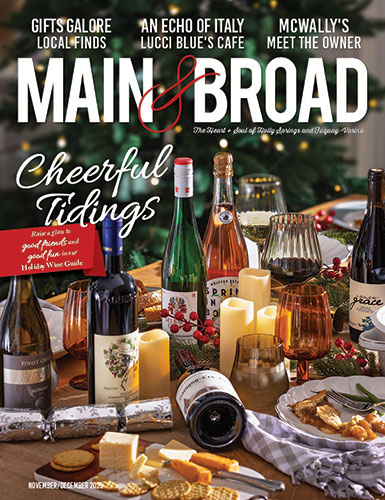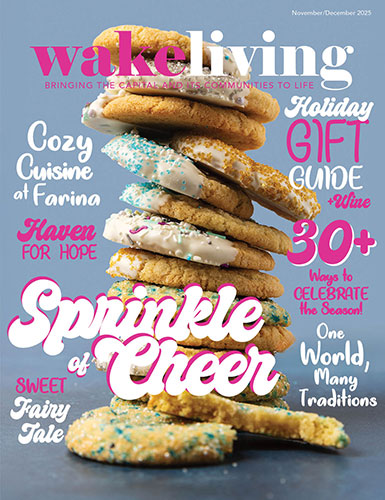Dressed in chef’s whites and wielding a large knife, Katelyn Holmes deftly dismembers a chicken.
The petite 16-year-old separates the breast portions and trims off the first two joints of each wing. They’re supposed to look like airplane wings, she says, as she finishes trimming the airline chicken breasts.
“I didn’t really cook for my family until I took this class and learned knife skills,” said the Apex High junior, one of three members of the school’s culinary arts team.
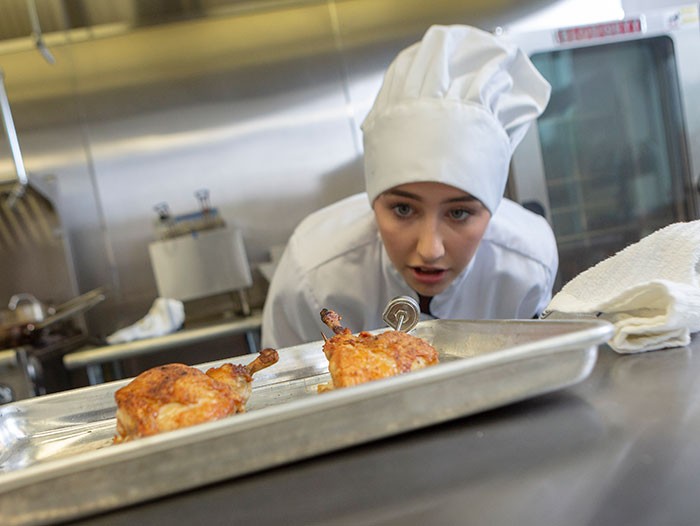
Katelyn Holmes, nicknamed the “protein whisperer,” says the airline chicken breast is difficult to cook, because the margin of error between raw, done and dried-out is extremely narrow. “It’s hard to cook, and it elevates the look of the plate,” she says.
Having won gold medals and $15,000 in scholarships at a February statewide contest held at Johnson and Wales University in Charlotte, the team is training for a national competition in Atlanta.
Margaux Whitley, who does much of the cutting and chopping for the team, was given a $170 Shun chef’s knife by her parents after the team won the state title. She hopes for a career in food science, and the Japanese blade will go with her as she works toward her dream of attending Johnson and Wales.
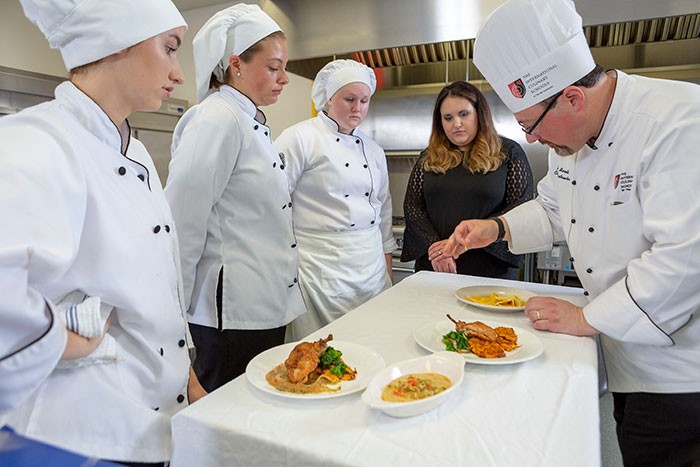
Chef John Boretti, right, of the Art Institute of Raleigh-Durham, critiques the dishes prepared by the Apex High School culinary arts team. Boretti provided valuable professional tips, says Apex culinary instructor Erica Hoskins, center. “He fills in the gaps for me,” she says.
“I’ve thought about how hard culinary school actually is, because there’s so much competition to be the best,” said Margaux, 16. “There’s a lot of pressure on girls for them to step up and be equal.”
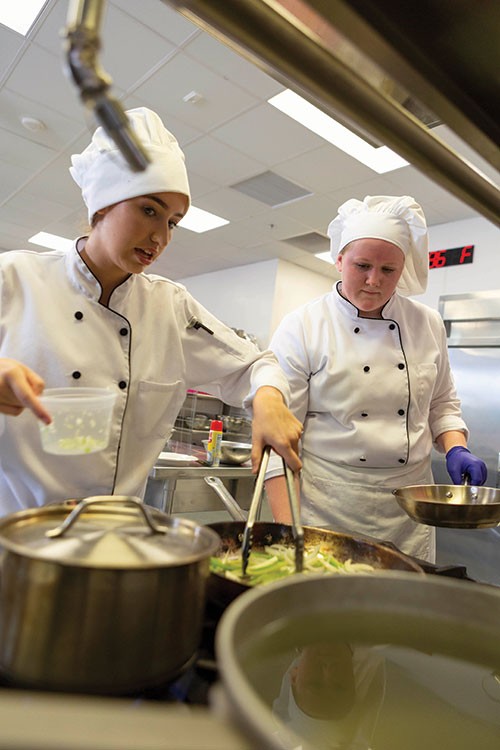
Katelyn and Amanda take turns at the stovetop during a practice session in Apex High’s industrial teaching kitchen. Teamwork and communication is key during competition because time is short and space is limited. “You have to rely on other people and trust other people, that they’re going to do their part,” says Katelyn.
In Apex High’s gleaming industrial teaching kitchen, the curriculum is culinary arts — not home economics. The rigorous training prepares students for careers in the male-dominated food industry. And as they work through the recipes, the teens are also developing the grit they will need to be successful.
“I burned my hand one time during practice pretty bad,” said Margaux. “The pot handle was turned into the steam from another pot, and I didn’t even think about it. I had to push through, finish cooking and get everything on the plate.”
The third member of the team, Amanda Marrott, calls cooking “a passion,” but she isn’t sure she wants it as a career. She enjoys the challenge of competition, however, and went to Charlotte with the 2017 team and again in 2018.
“I feel like I’ve gained a lot of confidence from last year to this year,” said the 16-year-old. “I followed and was quiet in kitchen last year, but this year working with this group of girls, I’ve gained confidence and I’m able to project that onto the plate. I can say, ‘I’m proud of this.’”
Katelyn, who hopes to become a private chef or a caterer, has also learned more than cooking skills while on the team.
“I’ve definitely learned how to work with other people,” she said. “When you get these menus, you realize there’s no way one single person could possibly cook that. You have to rely on other people and trust other people.”
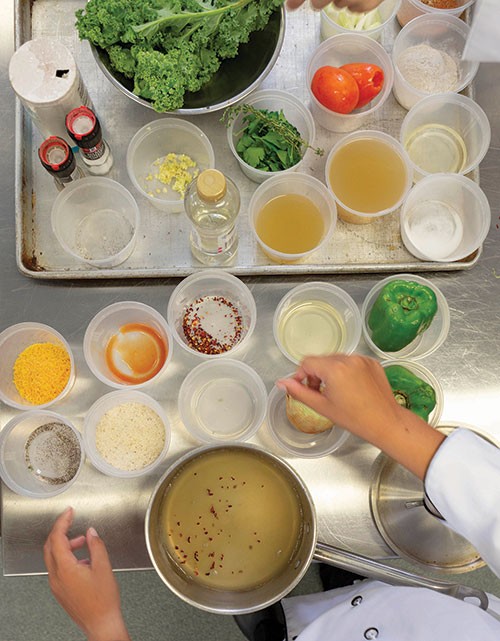
Before practice starts, all ingredients for the menu are measured and labeled. Hoskins says one of the challenges the Apex team faced was buying ingredients for the practice sessions. “It has been challenging. We don’t always run full menus because of cost. We stretch it out. We don’t throw away anything,” she says.
Training for success
While the competitions are exciting, Erica Hoskins, culinary arts instructor at Apex High, says learning perseverance, confidence and teamwork is the real objective.
“We’re prepping them to be successful employees,” she said.
Hoskins mentors the culinary team in her role as coach of the school’s Family, Career and Community Leaders of America club. There are about 30 students in the Apex chapter of the FCCLA, including Katelyn, Margaux and Amanda.
Through FCCLA activities and in class, Hoskins emphasizes the soft skills: looking people in the eye, learning to shake hands, navigating teamwork, communicating, problem-solving and how to work hard.
“They will not be successful in culinary class if they are not hard-working,” she said. “It throws them for a loop at the beginning. They’re sweating — they’ve never had to sweat in class before. They’re physically tired; they’re mentally tired.”
In addition to the national cooking competition in Atlanta, FCCLA sponsors contests in disciplines such as early child development, fashion design and entrepreneurship.
“Marketing has DECA, and we have FCCLA. It is outside of school, but it’s definitely something we weave into our curriculum,” said Hoskins.
“If we didn’t have the co-curricular club, the students wouldn’t have that real-world experience. This is throwing them in front of industry professionals.”
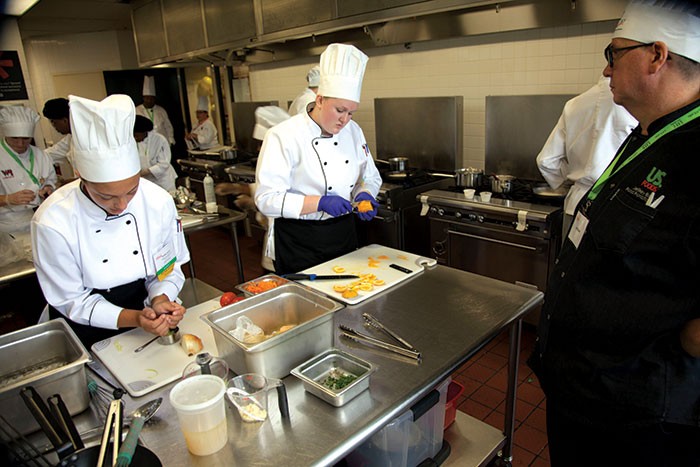
During the FCCLA Culinary Arts Competition in Atlanta June 30, teams from all over the country chopped, peeled, sauteed and simmered under the watchful eyes of judges. Each team was awarded points for appearance, taste, safety and sanitation, and food production.
Road to Atlanta
Chef John Boretti, a culinary instructor for about 10 years and one of the judges at the Charlotte competition, is one of those industry professionals. He was impressed with the Apex team and asked if he could coach them as they prepared for Atlanta.
“There’s a lot of passion in them. They have a pure heart; they’re doing it because they genuinely want to do something great,” he said. “They were consistent, they were measured, they stayed on task, and it really made an impression on me.”
What also charmed Boretti was the team’s hunger for knowledge, “gobbling up” any advice he gave them.
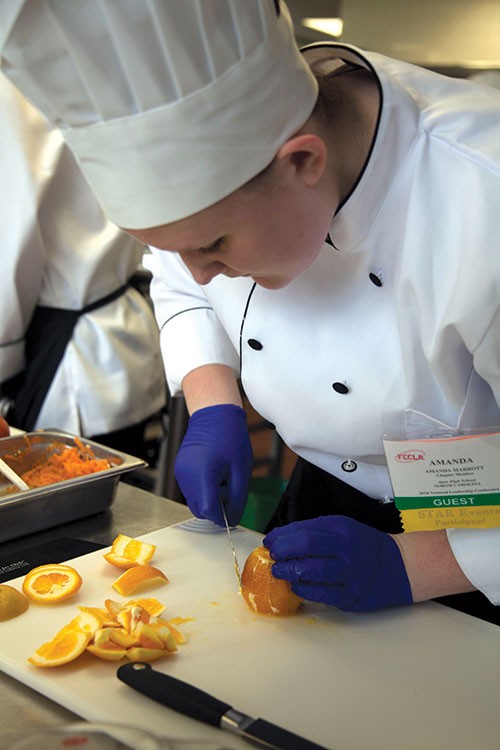
Amanda peels and sections oranges, creating orange supremes for her crepes Suzette, during the Atlanta competition. Leading up to the event, she made lots of crepes for her family. “We’re kind of sick of crepes at this point,” she says.
“The skills that they had developed were really well under control. They needed fine-tuning, which is common,” he said. “I’d give them a little piece of advice and when I showed it to them, they would instantly embrace it.”
One lesson involved the science of hot sugar and how to stabilize a tricky caramel sauce with a bit of orange juice.
“Recipes don’t make food; chefs make food,” he told them. “They were blindly following the recipes, but if you don’t understand the science behind it — how the recipes are made — it makes it harder for you.”
The challenging Atlanta menu was hard enough. During the July 1 competition, the girls prepared spicy holy trinity (bell pepper, onions and celery) on cheese grits, Creole airline chicken breast, sweet potato rosti, sauteed kale, and crepes Suzette with orange supremes and caramel orange sauce.
With the roughly three dozen teams preparing the same menu, points were given for appearance, taste, safety and sanitation, and food production. Any team with a score of 90 points or higher walked away with a gold medal, and the top three teams were awarded scholarship prizes.
The Apex team came home with silver medals, their menu getting between 80 and 89 points. All juniors, the team is looking forward to next year.
“I think we were well prepared,” said Amanda. “I’m proud of what we did. We might not have gotten first, second or third, but we definitely learned a lot of things that will help us when we compete next year.”



